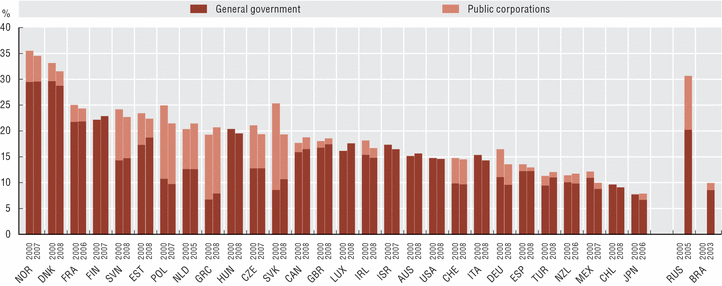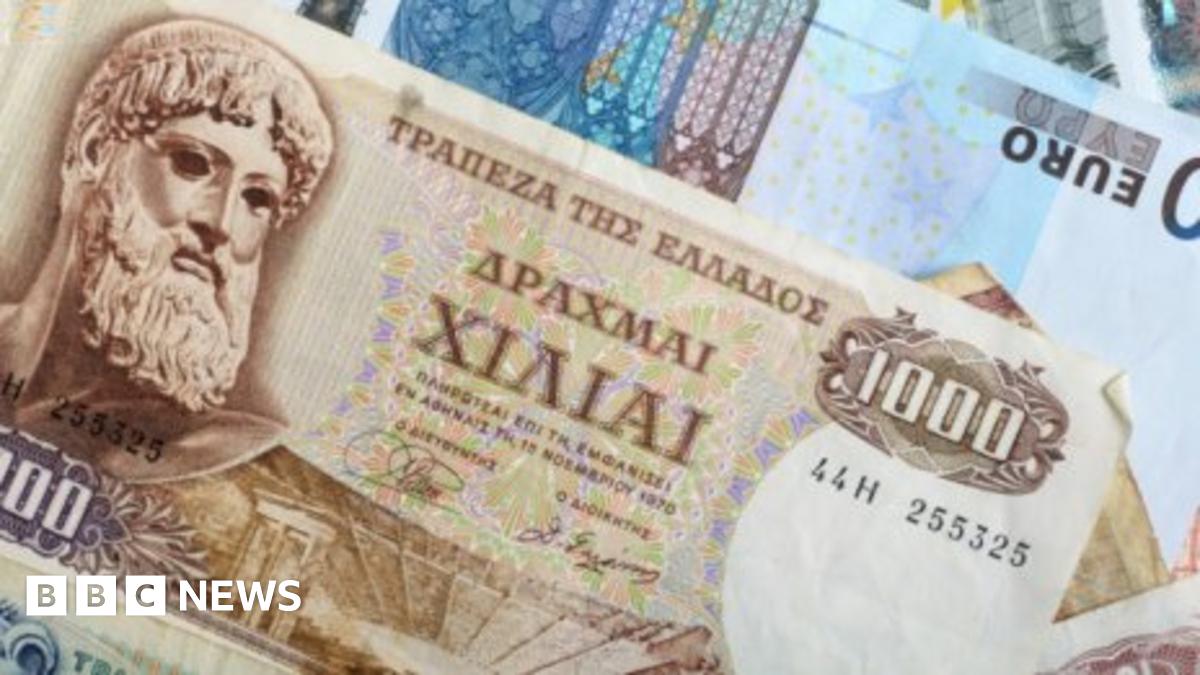Originally posted by giblets
View Post
Announcement
Collapse
No announcement yet.
[civil] "Greece moves closer to eurozone exit after delaying €300m repayment to IMF "
Collapse
X
-
Would you like to bet about how quickly the new Drakma tanks in value? They will be in default, the will have to print money just to pay day to day expenses, and the country exports very little while having to import virtually everything.Try http://wordforge.net/index.php for discussion and debate.
-
yes, but the average, as i have said and as the article admits, is 61.7. this is higher than the averages in france, italy and germany. the average greek retires at 61.7 years of age; of course some retire earlier.Originally posted by Dinner View PostCockney, many, many, many government workers in Greece, who are most workers, retire at 50.
http://www.cbsnews.com/news/europe-b...e-at-50-rules/
and as i have told you, most greeks do not work for the state."The Christian way has not been tried and found wanting, it has been found to be hard and left untried" - GK Chesterton.
"The most obvious predicition about the future is that it will be mostly like the past" - Alain de Botton
Comment
-
They can just cut Greek banks and government off from central bank funds and you will be out of the Euro with in 24 hours. They have already cut you off from 2/3rds of the funding mechanisms and refuse to accept Greek debt as collateral. All Greek banks have now is emergency liquidity assistance so that is the last rung on the ladder.Originally posted by Bereta_Eder View PostTo get serious for a moment, there is no way for anyone to "kick us out of the euro".Try http://wordforge.net/index.php for discussion and debate.
Comment
-
You can't have close to half of the population eligiable to retire at age 50 with 100% pensions. Stop dancing around and pretending this isn't a major issue which massively drives up government pension costs.Originally posted by C0ckney View Postyes, but the average, as i have said and as the article admits, is 61.7. this is higher than the averages in france, italy and germany. the average greek retires at 61.7 years of age; of course some retire earlier.
If the Germans can work to age 68 then the Greeks can to. They might not like it but they can't afford such lavishing benefits.Try http://wordforge.net/index.php for discussion and debate.
Comment
-
22.3% is not close to half, and the average retirement age is 61.7. what is so hard to understand about this?Originally posted by Dinner View PostYou can't have close to half of the population retiring at age 50 with 100% pensions. Stop dancing around and pretending this isn't a major issue which massively drives up government pension costs.
If the GeRomans can work to age 68 then the Greeks can to. They might not like it but they can't afford such lavishing benefits.
here are the graphs
greece is EL.
unfortunately i cannot find a graph for government workers from 2011, but the figure is consistent with OECD figures from 2000/2008
 "The Christian way has not been tried and found wanting, it has been found to be hard and left untried" - GK Chesterton.
"The Christian way has not been tried and found wanting, it has been found to be hard and left untried" - GK Chesterton.
"The most obvious predicition about the future is that it will be mostly like the past" - Alain de Botton
Comment
-
How can a currency that doesn't currently exist tank in value? The starting value of the drachma is whatever rate they decide to convert euros to drachmas. After that any change in the value of drachma depends on the supply of drachmas. They don't have to print money to pay day to day expenses if they have a primary surplus.Originally posted by Dinner View PostWould you like to bet about how quickly the new Drakma tanks in value? They will be in default, the will have to print money just to pay day to day expenses, and the country exports very little while having to import virtually everything.
Comment
-
What do you want to bet that is just federal and ignores states and local governments as well as SOES owned by state or local governments?Try http://wordforge.net/index.php for discussion and debate.
Comment
-
there's a debate to be had about retirement ages and the amount of government employees, but the starting point for any debate must be the facts of the matter."The Christian way has not been tried and found wanting, it has been found to be hard and left untried" - GK Chesterton.
"The most obvious predicition about the future is that it will be mostly like the past" - Alain de Botton
Comment
-
if you have some evidence please feel free to post it.Originally posted by Dinner View PostWhat do you want to bet that is just federal and ignores states and local governments as well as SOES owned by state or local governments?Last edited by C0ckney; June 5, 2015, 21:02."The Christian way has not been tried and found wanting, it has been found to be hard and left untried" - GK Chesterton.
"The most obvious predicition about the future is that it will be mostly like the past" - Alain de Botton
Comment
-
The currency which currently exists is the Euro and the Drakma is going to be worth a hell of a lot less than it. What is going to happen is that the government will announce it late at night one day, the banks will stamp the Greek euros (the ones with greek on the back side of the notes) as new drackmas at a 1:1 to exchange and as soon as the markets open no one will want the new drackma so it's exchange rate will sink and sink. Especially as the economy really sinks into depression. Imports will stop as no one will accept drackmas, shortages will quickly develop, huge numbers of additional people will be laid off, and the current economic problems will like a whole lot better in comparison.Originally posted by giblets View PostHow can a currency that doesn't currently exist tank in value? The starting value of the drachma is whatever rate they decide to convert euros to drachmas. After that any change in the value of drachma depends on the supply of drachmas. They don't have to print money to pay day to day expenses if they have a primary surplus.
I bet it will take some time to recover from that.Try http://wordforge.net/index.php for discussion and debate.
Comment
-
Saying "the drachma is going to be worth less than the euro" is meaningless. It doesn't matter what the nominal value of a currency is. Does it matter if a yen is worth a lot less than a dollar? If they decided that 1 drachma = 10 euros would that make Greece's economy better? The value of a drachma would depend on the supply of drachmas. You can't simultaneously have massive inflation resulting from easy money and be in a depression. Greece may have supply side problems but they aren't responsible for the current situation of deflation and massive unemployment.Originally posted by Dinner View PostThe currency which currently exists is the Euro and the Drakma is going to be worth a hell of a lot less than it. What is going to happen is that the government will announce it late at night one day, the banks will stamp the Greek euros (the ones with greek on the back side of the notes) as new drackmas at a 1:1 to exchange and as soon as the markets open no one will want the new drackma so it's exchange rate will sink and sink. Especially as the economy really sinks into depression. Imports will stop as no one will accept drackmas, shortages will quickly develop, huge numbers of additional people will be laid off, and the current economic problems will like a whole lot better in comparison.
I bet it will take some time to recover from that.
Comment
-
That goes over the process of switching currencies. Greece is going to be ****ed and they are going to wish they had just swollowed their medicine instead of following the pied piper down this rabbit hole especially when the banks start failing and they find out all of the country's debts are denominated in either euros or dollars neither of which they have. So the only option will be to print drackmas worsening inflation.
The good news is after a few years things will stablize, the country will stop destroying capital and will finally be forced to get its **** together despite the demands of ignorant people, inflation will have lessened their absurd pension debt obligations and made their German level minimum wage much, much smaller so maybe it might be worth hiring Greek workers again even if they have terrible productivity per hour.Try http://wordforge.net/index.php for discussion and debate.
Comment
-
The BBC article doesn't say how much a new currency would devalue after capital controls are lifted, since that depends entirely on monetary policy. If Greece has a primary surplus (they apparently do) why would they be forced to print money to pay their bills?
Comment
-
They do not have a surplus; they are deficient by 2% of GDP. The government debt is owed in Euros and Dollars, something they don't have, they will only have new drackmas, so they will attempt to convert new drackmas into dollars and euros to pay their debt payments. That is going to mean an awful lot of new drackmas out there.Try http://wordforge.net/index.php for discussion and debate.
Comment
-
I thought we were talking about what would happen after a default? Why are you talking about debt payments? And don't they have a primary surplus?Originally posted by Dinner View PostThey do not have a surplus; they are deficient by 2% of GDP. The government debt is owed in Euros and Dollars, something they don't have, they will only have new drackmas, so they will attempt to convert new drackmas into dollars and euros to pay their debt payments. That is going to mean an awful lot of new drackmas out there.
Comment


Comment